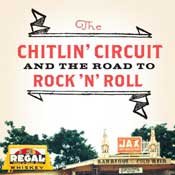I began reading Preston Lauterbach's book with a background in rock music, somewhat aware of the history and legends of the blues and the birth of rock 'n' roll. I was surprised, as I think even major music historians would be, by an array of stories I had never heard before. "The Chitlin Circuit and the Road to Rock 'N' Roll" (W. W. Norton & Company, 2011, $26.95) tells the history of the black musicians who played the circuit of second-rate venues known as the "chitlin' circuit," named for a meal consisting of pig intestines.
Lauterbach delves deep into the real and personal history of not only the musicians who played the chitlin' circuit, but also the bookies and underworld managers who made it possible. At times, the avalanche of names of artists and places can seem overwhelming, but Lauterbach skillfully weaves these characters in and out of the narrative before coming back to his central figures, including Denver Ferguson, the black Indianapolis businessman, racketeer and band promoter who transformed Indiana Avenue with his clubs and numbers racket. Lauterbach's portrayal of Ferguson treads the line between the personal and the legendary, as he creates a portrait of a man on the other side of the law who nevertheless built a name for himself and his community in a segregated and racist environment, and built the foundation of the chitlin' circuit.
This is not the standard history of black music you may be used to reading. It hits on the big names, but focuses its attention on seedy venues and the popular bands that lived from show-to-show. This is not the world of Duke Ellington and posh ballrooms. It is the history of the music that never made it into the white mainstream, but formed a vital cultural and economic part of still-segregated black communities. Lauterbach traces the history of the chitlin' circuit from the days of big swing bands to the rise of rock 'n' roll and "urban renewal" on Beale Street.
"The Chitlin Circuit" does not read like a first book, nor is it a bland history text.
Lauterbach's writing is as lively and vivacious as his subject matter. His prose has a certain swagger and swing to it, and he shares the jargon and language of the characters whose lives he chronicles. Lauterbach's research must have been exhaustive; he writes like a man telling a first-hand account of the chitlin' circuit. Nowhere is this passion felt more strongly than in his description of the tragic Natchez fire, where maestro Walter Barnes and his band died playing "Marie," heroic pillars of calm as the Rhythm Club burned around them.
"With the final breath of his life, trumpeter Paul Stott blasted a note, just as the inferno gulped the remaining oxygen, collapsing the tin roof and walls, and crushing every still-heaving lung," he writes.



Comments
Use the comment form below to begin a discussion about this content.
comments powered by Disqus